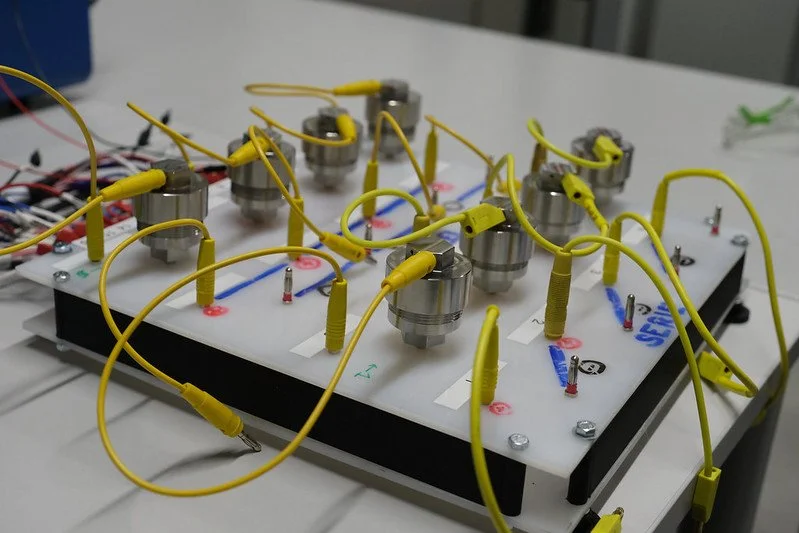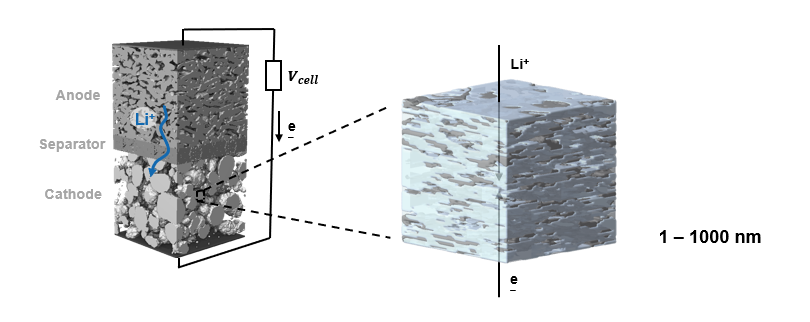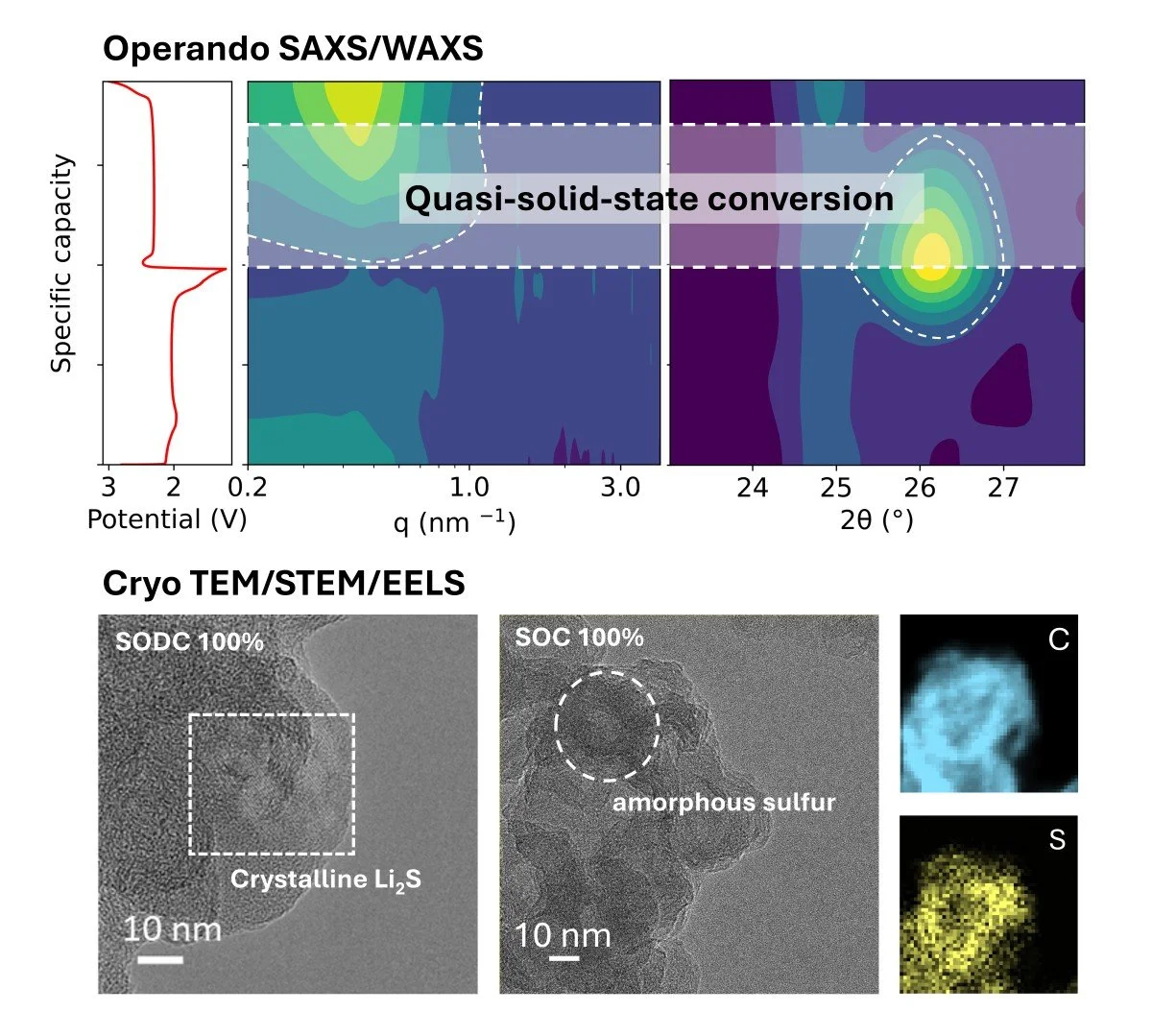Systems Materials Engineering for Post-Lithium-Ion Batteries
Batteries will be key in our efforts to reduce CO2 emissions but require major progress in sustainability, cost, and energy density. Our research focuses on understanding the interplay between individual materials, multiphase structures, and the overall system properties in future electrochemical energy storage. Systems of interest are supercapacitors, metal-air batteries and metal-sulfur batteries or, broadly, any system with complex physical-chemical phenomena in confined geometry.
Our research is based on
The development of new methods: Operando small angle x-ray/neutron scattering and cryo transmission electron microscopy are combined with stochastic modelling and machine learning for data analysis. Machine learning will be integrated into the experimental workflow to deal with the complexity of future battery systems.
The focus on the fundamentals: Electrochemical phase transformation and charge storage mechanisms, as well as structure-property relationships at nanoscopic length scales from 1 – 1000 nm.
A holistic systems materials engineering approach: We aim to put emerging energy storage systems into practice by identifying how the physicochemical interplay of materials across length scales defines overall systems properties. So far, much of the focus to realize post-lithium-ion batteries has been on materials chemistry; We aim to shift the focus on the rational structuring at mesoscopic length scales (1 - 1000 nm), to enhance transport and control phase transformation.
News
New Paper in ACS Energy Letters: Bridging Solution and Solid-State Mechanism in Li–S Batteries
In our latest work, we investigate how sparingly solvating electrolytes (SPSEs) enable a confined “quasi-solid-state” conversion mechanism in lithium-sulfur batteries. Using operando small- and wide-angle X-ray scattering and cryo-TEM, we show that SPSEs promote the coexistence of lithium sulfide and sulfur well beyond the 50% state of charge, highlighting a distinct charge/discharge mechanism compared to solvating electrolytes. The results point to confined polysulfide conversion at the carbon interface, suggesting new pathways for high-rate, high-capacity Li–S batteries with improved stability. [Link to Paper]
- 26/10/2025
New Paper published in ACS Nano: Synergistic Nanoscale Probing of Li–S Batteries via CryoTEM/EELS and Machine Learning-Enhanced Operando SANS
In this work, we combine cryogenic TEM and EELS with operando small-angle neutron scattering (SANS), accelerated by machine learning, to investigate Li-S batteries at the nanoscale. This multimodal approach reveals biphasic discharge products and supports a disproportionation-driven conversion mechanism. The integration of high-resolution imaging with ML-guided neutron scattering sets a new benchmark for probing complex electrochemical systems. [Link to paper]
– 01/05/2025
New Paper published in Batteries & Supercaps: Operando Scanning SAXS/WAXS for All-Solid-State Battery Systems
Understanding the spatio-temporal dynamics of all-solid-state batteries (ASSBs) has been hindered by the lack of operando scattering methods under realistic conditions. In this work, we developed a novel operando cell that enables cross-sectional scanning SAXS/WAXS measurements under high pressure, allowing simultaneous, time-resolved mapping of crystalline phase evolution and nanoscale structural changes across battery layers. [Link to paper]
– 01/09/2025
Exciting news! The Energy Materials Lab has secured significant funding through the M-ERA.NET program. In collaboration with the National Institute of Chemistry (NIC, Slovenia), the IWS Fraunhofer Institute Dresden, TU Dresden, and the start-up Sixonia (all Germany), we are launching the project OCULUS. This initiative aims to enhance the rate performance and cycle life of all-solid-state sulfur batteries, driven by detailed insights from operando analytical tools.
– 01/03/2025
New Paper: Understanding Capacity Limitations in Long-Life Li–S Batteries. We report Li–S batteries with long cycle life using nanoporous carbon cathodes and carbonate-based electrolytes. Using operando SANS, XRD, and EIS, we show that primarily charge transfer, not Li-ion diffusion, limits performance. The findings pave the way for higher sulfur loading and improved rate capability. [Link to paper]
– 01/12/2024
Welcome to our new Ph.D. student Sven Dunkel!
Sven holds a Bachelor Degree in Mechatronic Engineering from TU Darmstadt and recently completed his Master in Energy Science and Technology at ETH Zurich. With his engineering background and experience in Li-S batteries, he is an excellent fit for our group and the Department in general. His research will focus on hard carbon synthesis for sodium-ion batteries using data-driven process optimization.
– 01/12/2024
Inspiring Future Scientists: CPM OpenLab Days 2024
On June 25–26, 2024, the Department of Chemistry and Physics of Materials at the University of Salzburg hosted its first CPM OpenLab Days, welcoming 230 regional students aged 16–18. The event offered hands-on experiments, insights into cutting-edge materials research, and interactive sessions with scientists and students. From sustainable batteries to bio-inspired materials, the two days sparked curiosity and enthusiasm for science. Due to its success, the event is set to return regularly.
– 01/07/2024
Welcome to our new Ph.D. student Klara Neumayr!
Klara studied Physics at Ludwigs-Maximilian University Munich (LMU) and has expertise in machine-learning-based battery lifetime prediction. Her research will build on that and combine data science methods with electrochemical testing and X-ray scattering of post-Li-ion batteries. The team looks forward to learning from Klara´s expertise in Machine Learning and applying this knowledge to conversion-type battery systems.
– 01/02/2024
Our new SAXS/WAXS facility, XEUSS 3.0 from Xenocs, has arrived! It has been installed in the last three weeks. We are looking forward to the first measurements starting next week. The new SAXS/WAXS facility will be crucial for operando testing post-Li-ion batteries and electrochemical phase conversion in confinement.
– 15/11/2023
We are excited to announce that Christian Prehal has received an ERC Starting Grant and 2.37 M Euro funding to work on next-generation lithium-sulfur batteries. The SOLIDCON project will focus on developing new metrologies, advanced data analysis methods, and understanding the fundamentals of solid-liquid-solid and solid-state sulfur conversion. Based on nanoscopic structuring (1-1000 nm), we aim to realize stable high-energy lithium-sulfur batteries. A big thank you for all the support in recent years, to Paris Lodron Universität Salzburg, and to the European Research Council (ERC) for funding curiosity-driven fundamental research.
– 22/11/2022
Christian Prehal
Since the summer of 2023, Christian has been an assistant professor in the Department of Chemistry and Physics of Materials at the University of Salzburg. Until then, he was a researcher and lecturer in the Materials and Device Engineering Group at the Department of Information Technology and Electrical Engineering at ETH Zürich. In Salzburg, he will work on his recently funded ERC Starting Grant and set up his research laboratory for batteries and energy materials. In his research, he wants to tackle the complexity problem of future battery systems by developing new experimental methods and combining them with machine learning for data analysis and experiment optimization.















